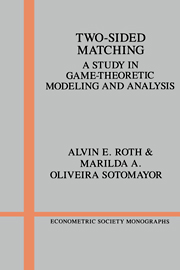Book contents
- Frontmatter
- Chapter 1 Introduction
- Part I One-to-one Matching: the Marriage Model
- Part II Many-to-one matching: models in which firms may employ many workers
- Part III Models of one-to-one matching with money as a continuous variable
- Chapter 7 A simple model of one seller and many buyers
- Chapter 8 The assignment game
- Chapter 9 A generalization of the assignment model
- Part IV Epilogue
- Bibliography
- Name Index
- Subject index
Chapter 9 - A generalization of the assignment model
from Part III - Models of one-to-one matching with money as a continuous variable
Published online by Cambridge University Press: 05 January 2013
- Frontmatter
- Chapter 1 Introduction
- Part I One-to-one Matching: the Marriage Model
- Part II Many-to-one matching: models in which firms may employ many workers
- Part III Models of one-to-one matching with money as a continuous variable
- Chapter 7 A simple model of one seller and many buyers
- Chapter 8 The assignment game
- Chapter 9 A generalization of the assignment model
- Part IV Epilogue
- Bibliography
- Name Index
- Subject index
Summary
This chapter presents one of the generalizations of the assignment game, in which agents' preferences may be represented by nonlinear utility functions. So in this model agents are allowed to make somewhat more complex tradeoffs than in the assignment model between whom they are matched with and how much money they receive. Nevertheless, each of the principal results we proved for the marriage market has a close parallel in the present model.
This model is a variant of a model introduced by Demange and Gale (1985). The only difference between the model presented here and their model is in the definition of feasible outcomes, which here allow monetary transfers to be made not only among matched pairs of agents, but also among arbitrary coalitions of agents, as in the assignment model and the one-seller model explored in the previous two chapters. Aside from making this model a generalization of these other models, this change allows us not to rule out a priori the kinds of strategic opportunities available to coalitions of bidders, for example, that we discussed in Sections 1.2 and 7.2.1. However most of the results from Demange and Gale's model carry over unchanged to the case when monetary transfers are allowed between unmatched agents. The reason is that as in the assignment game, no such transfers are made at stable outcomes. That is, we will see that the only monetary transfers that occur at stable outcomes are between agents who are matched to each other.
- Type
- Chapter
- Information
- Two-Sided MatchingA Study in Game-Theoretic Modeling and Analysis, pp. 222 - 240Publisher: Cambridge University PressPrint publication year: 1990



